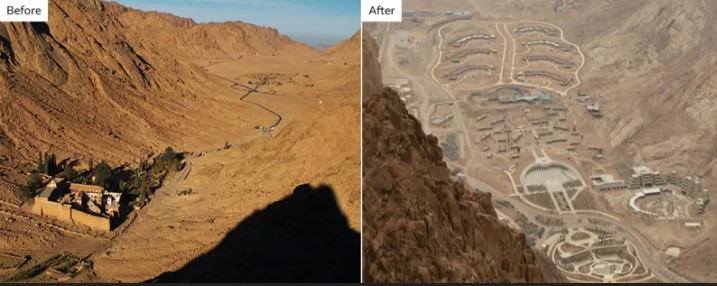Egypt’s Mt Sinai luxury tourism project sparks global outcry over heritage and Bedouin displacement

The state-backed initiative, part of the Great Transfiguration Project launched in 2021, envisions hotels, eco-lodges, shopping centres, a cable car to Sinai’s summit, and an expanded airport.
Egypt’s plans to transform Mount Sinai into a luxury tourism hub are facing mounting international criticism over concerns that the project threatens the sacred site’s heritage and displaces local communities.
The state-backed initiative, part of the Great Transfiguration Project launched in 2021, envisions hotels, eco-lodges, shopping centres, a cable car to Sinai’s summit, and an expanded airport.
More To Read
- Palestinian police to be trained in Egypt as Gaza rebuilds security forces
- Egypt rejects any attempts to divide Sudan: FM
- Africa imports over 70 per cent of its medicines — Local production of ingredients could change that
- Egypt inches closer to troop deployment in Somalia amid regional tension
- Ethiopia declares Nile rights non-negotiable, rejects Egypt’s ‘colonial-era’ claims
- Outrage as Israel sends freed Palestinian prisoners to Egypt instead of home
The developments directly affect St Catherine’s Monastery—a 6th-century Greek Orthodox site and UNESCO World Heritage landmark revered by Christians, Muslims and Jews. While the monastery itself remains intact, the surrounding desert is being reshaped by new roads and construction.
The project has also disrupted the lives of the local Bedouin Jebeleya tribe, long considered guardians of the monastery. Reports indicate that homes and tourist eco-camps have been demolished without adequate compensation, and that graves in the local cemetery have been relocated to make space for a car park.
Interests of outsiders
“This is not development as the Jebeleya see it or asked for it, but how it looks when imposed top-down to serve the interests of outsiders over those of the local community,” Ben Hoffler, a British writer who works closely with Mount Sinai’s indigenous communities, told the BBC.
“A new urban world is being built around a Bedouin tribe of nomadic heritage. It's a world they have always chosen to remain detached from, to whose construction they did not consent, and one that will change their place in their homeland forever.”
Egyptian authorities, however, defend the project, describing it as a gift from Cairo to the world and to people of all faiths.
“The project will provide all tourism and recreational services for visitors, promote the development of the town [of St Catherine] and its surrounding areas while preserving the environmental, visual, and heritage character of the pristine nature, and provide accommodation for those working on St Catherine's projects,” Housing Minister Sherif el-Sherbiny said last year.
Critics argue the development, currently on hold due to funding constraints, risks destroying the site’s unique spiritual and natural landscape.
UNESCO has previously urged Egypt to halt construction and adopt a conservation plan, while World Heritage Watch has called for the site to be placed on the List of World Heritage Sites in Danger.
Campaigners have also appealed to King Charles, patron of the St Catherine Foundation, to intervene and help safeguard the monastery’s centuries-old manuscripts and cultural legacy.
Top Stories Today













































